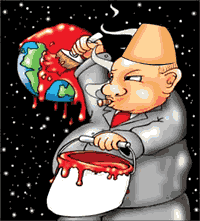 More and more your favourite Beed gets to experience how far off the radar Nepal has dropped in the international economic arena. Not that we had a very big blip anyway but now we don't even register.
More and more your favourite Beed gets to experience how far off the radar Nepal has dropped in the international economic arena. Not that we had a very big blip anyway but now we don't even register. It is just another conflict-prone zone and the past four years has become just another dateline with bad headlines. True, the concerns of tour agents about Nepal's security situation is dwindling due to the ceasefire the fact that no place on earth is safe anyway and at least in Nepal the violence is not arbitrary.
But for potential investors, it is just another country in the long list of high-risk hot-spots like Iraq, Afghanisthan, Haiti and Sudan. If Nepal shuts down for months, it ain't gonna affect no one much anyway. The more an economy is integrated into the global economy the more its chances of stability and economic growth. Even in communist-ruled West Bengal in India the setting up of call centers and outsourcing businesses have made the government conscious about curbing the state's notorious labour problems.
If a few cities in India are closed down repercussions can be felt across the world. Similarly, a strike at a Malaysian or Thai airport can throw the supply chain of retail stores in Europe out of gear.
As Nepal searches for stability perhaps it may be possible to use economic reform measures to be able to participate in the progress of the global economy. Your Beed has always maintained that the solution to the ongoing conflict can neither be political or military, it has to be economic. If Nepal becomes an offshore banking facility for the increasingly affluent Indian and Chinese, then we may not be able to afford strikes anymore, or have holidays to commemorate eclipses and a time zone off whack by 15 minutes.
Similarly, if Nepal becomes a large power exporter, we will have to ensure that it meets reliability criteria of its clients. Thailand's grid is interwoven with power producers in Laos and would never allow disruptions there. The importance of nations is not judged by its geopolitical and strategic location anymore, now it is how intricately it is linked to the global economy.
So if you are producing goods or services for other nations, you better have your house in order and vice versa: if you don't you will not be producing goods and services for others. If you are not a part of the global business link you will be forgotten. Burma is rich in natural resources, but is virtually ignored by the rest of the world. And there are many other countries in Africa similarly bypassed.
For Nepal to get out of the current quagmire, we have to explore different approaches to global integration. Surely there is a big role here for overseas Nepalis eager to invest in their motherland. Maybe they could be the first link in the chain by investing here despite the odds, instead of just focusing on how to get dual-citizenships and own property here. They could catalyse the movement of products, capital and services.
If this happens, Nepal can't afford to have strikes, conflict and political instability. And everyone would benefit. While we're at it, let's think outside the box, not just outsourcing, tourism and manufacturing but also a health destination, medical tourism, destination for retirees. The objective would be to pursue more than a single idea. We still have not been fully written off but we need to ensure that we are not. A country of 25 million does not deserve being just another black hole on the globe.



